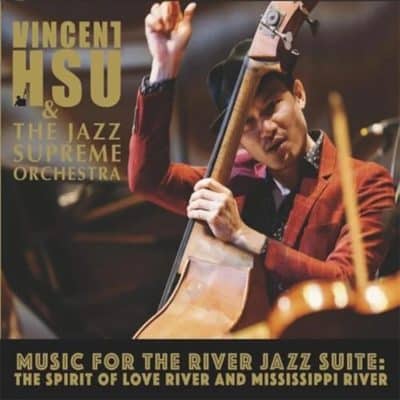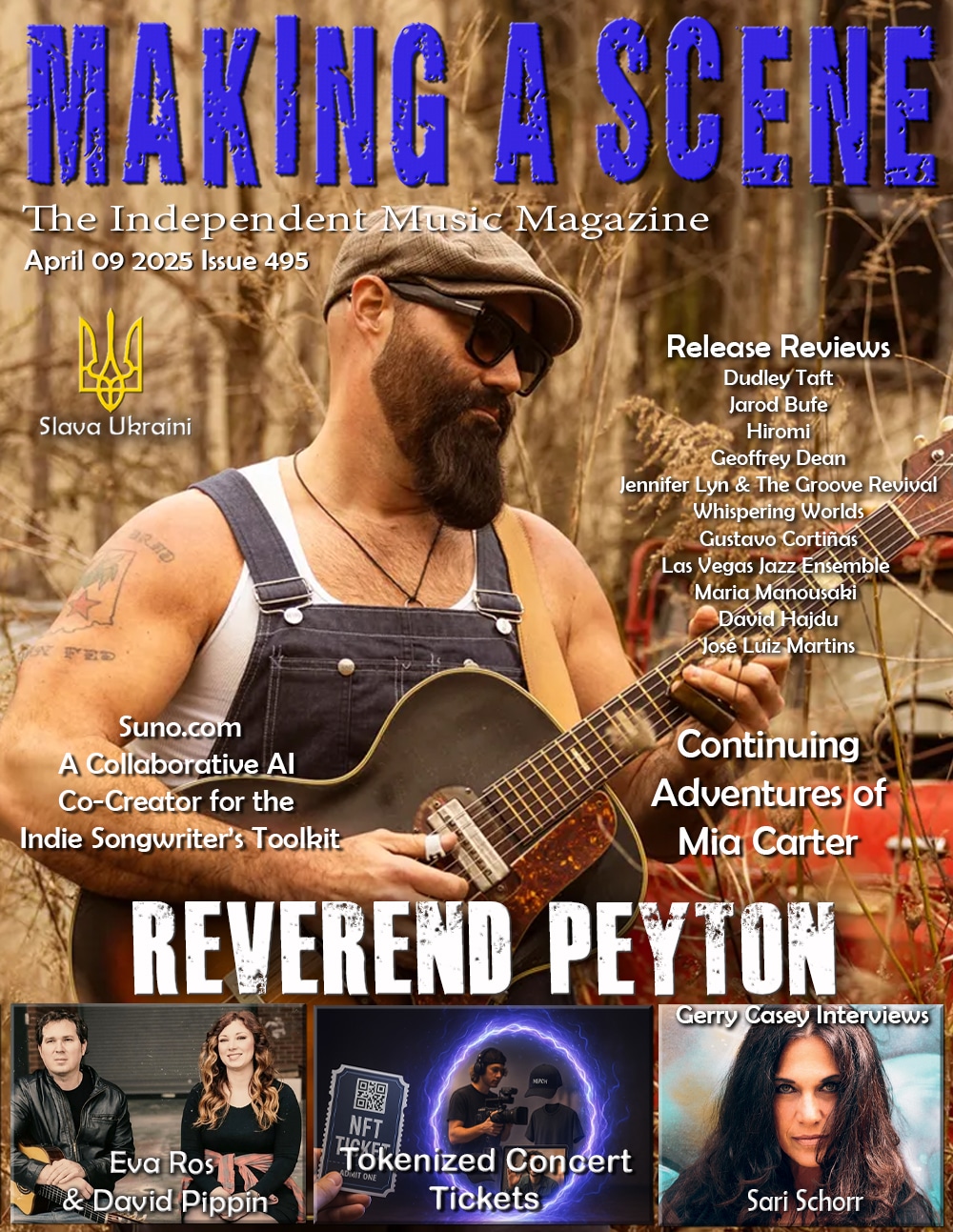Vincent Hsu Music for the River Jazz Suite: The Spirit of Love River & Mississippi River
 Vincent Hsu
Vincent Hsu
Music for the River Jazz Suite: The Spirit of Love River & Mississippi River
Truth Revolution
Bassist and composer Vincent Hsu’s stunning and surprising Music for the River Jazz Suite: The Spirit of Love River & Mississippi River finds common ground between two seemingly disparate great rivers: Love River of Hsu’s hometown of Kaohsiung, Taiwan and the well-storied in jazz and other forms of American music, Mississippi River. Hsu is proud to claim that his Afro-Cuban undertones, of which Hsu has played extensively for most of his career, are very much alive in Taiwan. Hsu’s fourth album as a bandleader presents this live recording from Taiwan’s Weiwuying Recital Hall. It is Hsu’s first work for a large ensemble and features his own compositions performed by a 12-piece band. He is joined by saxophonists Hank Pan, Shen-yu Su, and Jonas Ganzemüller, trumpeter Wen-feng Cheng, violinist Yu-chen Tseng, clarinetist Chieh-an Fan, trombonist Yi-chun Teng, guitarist Shih-chun Lee, pianist Musaubach, drummer Kuan-liang Lin, and conga player Carol Huang. The ensemble Hsu dubbed The Jazz Supreme Orchestra, features 10 Taiwanese musicians and a pair of musicians from Argentina and Germany.
Tsu took inspiration for the project from his visit to New Orleans 15 years ago when his trip on a steamship had him thinking about how jazz was related to these steamboat voyages for one hundred years as it passes through a number several cities. Yet, this observation is especially telling. As Hsu says, “I also saw how the movement and the waves of the river share the same kind of motion of jazz music when it comes to the swing feel.” He then drew parallels to Love River, a 7.5-mile river known as the spine of Kaohsiung, his birthplace in Taiwan. Yet, in contrast to the quote, the album begins somberly with “Cotton Field,” a lamentation on slavery, the slow tempo to reflect the reluctance of salves trudging to work in the fields. Yet, just two minutes in, the incessant beat of what could simulate a chain gang, the tempo and intensity builds, to connote the resilience and courage of these same slaves. Tenorist Shen-Yu Su as well as pianist Musaubach are prominently featured. “River Is Wide” with its strains of Dixieland and blues presents us with the duality of water – the notion that the river gives us life but can also take it away. Although doesn’t cite soloists at the end of the full ensemble piece, we hear feisty turns from trumpet, trombone, tenor, clarinet, while the pianist creates a wave-like motion.
“Rumba for the River Trilogy” consists of three compositions: “Father’s Melody”, “Memphis Creek” and “Dragon Dance.” Hsu notes, ““Father’s Melody” is about the melodies my father sang when I was little and represents my childhood influence.” These lullaby-like refrains at the outset and conclusion not coincidentally call to mind such iconic river melodies as “Old Man River” and “Swannee River” in a very subtle way although it later morphs into much grander interplay series of solos, led initially by the violin, then guitar, double bass, piano, and piano-percussion sequence dissolve into the mentioned lullaby-like refrains to conclude this rapturous movement. “Memphis Creek” is Hus’s attempt to reflect the city’s mixed musical cultures: Rock & Roll, Blues, Jazz, and Country. Soprano saxophonist Pan takes the lead with an incandescent turn, followed, as you’d expect, by guitarist Shih-Chun Lee, with the drums and congas then inviting the ensemble to bring it to an explosive climax. “Dragon Dance” portrays the Dragon Boat racing tradition held on Taiwan’s Love River during the annual festival on the fifth day of the fifth Chinese lunar month. This celebration safeguards individuals from malevolence and ailments throughout the year. Hsu comments, “I wrote it in 5/4 to imitate the pulse of the boat rowers, imagining the rowers shout out 1-2, 1-2-3 to synchronize their moves.”
The flow changes to the gentlest of ebbs on “Unknown Stars,” reflective of hope and determination as slaves in the South looked toward the stars for direction to escape to the North for freedom. This melancholic, gorgeous ballad features a tremendous duo passage from violinist Yu-chen Tseng and Hsu, as well as soprano saxophonist Hank Pan’s poignant statement. “A Pilot’s Day on the Mississippi River” is a composition about Mark Twain’s childhood dream to become a steamboat pilot, a story that has always resonated with the bassist-composer, citing this quote and its relationship to jazz music, “After Twain finally got on the boat, he realized how the Mississippi River always changes its course, and that it’s very challenging to navigate.” Consequently, this is a turbulent, volatile piece with jaw-dropping interactions and fierce blowing from saxophonists and brass.
Following the rhythmically hand clapped intro “River Workers” emerges as one of the more symphonic pieces, meant to commemorate the laborers who engage with the river as soon one of the tenorists joyously enters with a series of rapid-fire clusters, joined by Pan and Yu-chen Tseng as it reaches frenetic levels connoting the active workers. Closer “Oya” is in tribute to rain goddess Yoruba Orisha–Oya who mythically has the power to control storms and winds. The number she represents is 9 in Yoruba religion, hence the composition in the meter of 9/4. Like its predecessor, the piece begins deliberately and then blossoms into a galvanizing, roof raising exchange among the entire ensemble, putting the exclamation point on an unequivocally brilliant concert, filled with titanic moments.
- Jim Hynes
Buy Us a Cup of Coffee!
Join the movement in supporting Making a Scene, the premier independent resource for both emerging musicians and the dedicated fans who champion them.
We showcase this vibrant community that celebrates the raw talent and creative spirit driving the music industry forward. From insightful articles and in-depth interviews to exclusive content and insider tips, Making a Scene empowers artists to thrive and fans to discover their next favorite sound.
Together, let’s amplify the voices of independent musicians and forge unforgettable connections through the power of music
Make a one-time donation
Make a monthly donation
Make a yearly donation
Buy us a cup of Coffee!
Or enter a custom amount
Your contribution is appreciated.
Your contribution is appreciated.
Your contribution is appreciated.
DonateDonate monthlyDonate yearlyYou can donate directly through Paypal!
Subscribe to Our Newsletter
Discover more from Making A Scene!
Subscribe to get the latest posts sent to your email.












































